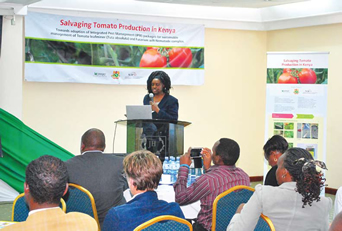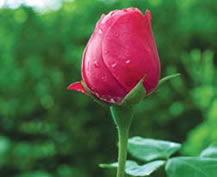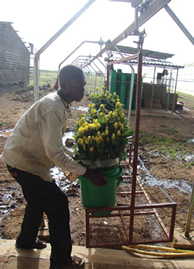Effective CCM begins on the farm and ends once the product reaches the customer. Therefore, a cold chain is definitely a strategic competitive advantage in
Author: admin
 Airflo is a known and respected brand amongst Kenya’s flower growers. Will it soon disappear given Panalpina’s acquisition of the company?
Airflo is a known and respected brand amongst Kenya’s flower growers. Will it soon disappear given Panalpina’s acquisition of the company?
Conrad: The new entity will be called Panalpina Airflo, so Kenya’s flower growers will still encounter the brand name, but more importantly they will still experience everything it stands for. Our customers will continue to receive the quality service that they are used to. In addition, they’ll also benefit from Panalpina’s global reach and expertise.
Colin: Conrad is right. Everything is being maintained—including more than 160 staff in Nairobi and Aalsmeer with their expertise and dedication. Airflo’s infrastructure, processes and attention to detail are also being preserved. Airflo’s legacy will definitely live on and Panalpina is bringing new ideas and people to the table.
What exactly do you mean by that?
Colin: A big benefit for customers is that Panalpina is great at connecting people and companies anywhere in the world, not just in Kenya and the Netherlands. Panalpina Airflo will help Kenyan growers to make the most of the worldwide opportunities available to them. The UK is an interesting market for example. The two companies combined can tailor-make solutions to fit individual customer needs for the UK. Together, we have a combined knowledge at product origin and product destination.
Conrad: Panalpina’s global reach and ability to network are definitely major advantages for our customers. Panalpina Airflo will bring different stakeholders to the table, in a way that is beneficial to everyone. We can connect growers with importers and exporters with growers. As one of the world’s biggest air freight users, Panalpina also has excellent relationships with the airlines. After all, Panalpina’s global annual airfreight volumes are many times those of Airflo.
“It’s all about the balance between continuity in the business and harmony in the family”
The strength of family business and its importance to an economy is widely praised. The family business is a success. But what about the ‘behind the scenes’ of all these success stories? What is ‘the real story’? Because where people work, there are strong emotions.
It seems that within the family, the emotional factor plays an even greater role than in a non-family business. Emotions can be a source of strength, but also a source of conflict. Why is one family business able to handle these emotions, whereas another family business becomes a victim of their emotions? In short: what is the psychology behind the family business?
Globally, 60% of companies are family businesses and in the flowers sector, the percentage is even higher. “We can, of course, address the issues that arise within families in a very substantive and technical way, but if we were to focus only on that, we would go wrong. Then you disregard the dynamics of a family business with its family bonds and emotions. Therefore, it is always an important skill when working with family businesses to find the balance between the continuity of the company and the harmony in the family.”
 As new trends emerge, Kenyan farmers in the future will have to innovate continuously in order to remain competitive; the farmers will need to respond to the permanent pressure on margins, professionalism, increase demand and face growers in abroad countries with excellent farming techniques.
As new trends emerge, Kenyan farmers in the future will have to innovate continuously in order to remain competitive; the farmers will need to respond to the permanent pressure on margins, professionalism, increase demand and face growers in abroad countries with excellent farming techniques.
Koppert Biological Systems (K) Limited is one input supplier that is increasing partnerships and always carrying out research and investigations on the new, easy and highly effective farming methods that will enable farms to increase their yield while making their farming an enjoyable experience, priding itself in helping Kenyan farmers remain the leaders in the world markets.
This was revealed when Koppert Biological Systems (K) Ltd in partnership with Kenyatta University brought a team of professionals in different fields of the agriculture sector together in a Nairobi Hotel to discuss how to salvage the tomato production in Kenya. The workshop which marked the inception of Tomato ARF funded project was attended by researchers, academicians and scientists from the private sector, different universities, KARLO, KEPHIS, Ministry of Agriculture, Livestock and Fisheries among others. The workshop was also attended by large scale and small scale farmers drawn from different parts of the country. The workshop was an inception of a three year cross-sectional survey research project.
Airfreight must improve service quality if it is to minimise the impact of customers with perishable goods switching to seafreight. Kuehne & Nagel’s global business
 Everyone around the world knows the tender feel and sweet smell that comes when you get in contact with a flower. Maintaining the quality of these gentle plants that bring color to our lives is an important aspect in all in the flower business. Kenya’s Floriculture Industry has currently embraced the importance of post harvest. A shift is noticeable from the perception that quality is only achieved from the field, with the current thinking being the need to maintain the quality even after harvest’ which is helping farmers have a higher bidding price at the market level. Losses at the post-harvest chain are more severe because they represent waste/loss of human effort, farm inputs and all other resources involved during production.
Everyone around the world knows the tender feel and sweet smell that comes when you get in contact with a flower. Maintaining the quality of these gentle plants that bring color to our lives is an important aspect in all in the flower business. Kenya’s Floriculture Industry has currently embraced the importance of post harvest. A shift is noticeable from the perception that quality is only achieved from the field, with the current thinking being the need to maintain the quality even after harvest’ which is helping farmers have a higher bidding price at the market level. Losses at the post-harvest chain are more severe because they represent waste/loss of human effort, farm inputs and all other resources involved during production.
Losses in postharvest range from 5 – 60% with occasionally losses at 100%, for example due to Botrytis Cinerea infection during the rainy season.
There are some 50 species of the fungus Botrytis, however, Botrytis cinerea has the largest host range. Botrytis is often referred to as gray-mold because it produces a crop of gray fuzzy-appearing spores on the surface of infected tissues. Several days of cool, cloudy or rainy weather creates an ideal environment for Botryis infections during production in a full greenhouse or out in the field. However this fungus grows on dead or dying plant tissue anywhere conditions are right; in greenhouses, the field, packing sheds, coolers or during shipping.
 A sigh of expectation filled the air as one of the biggest chemical companies in the world, BASF, launched an innovative fungicide that combines well known active ingredient Dimethomorph with Initium to form a preventive shield against downy mildew in ornamentals.
A sigh of expectation filled the air as one of the biggest chemical companies in the world, BASF, launched an innovative fungicide that combines well known active ingredient Dimethomorph with Initium to form a preventive shield against downy mildew in ornamentals.
Time almost audio recorded voice of Mr. Patrick Ngugi, Country Manager-Kenya, Crop Protection and public health asked, “Are you afraid of Downy mildew in your farm? Are you concerned by the ever increasing threat of resistance build up by fungicides? Are you afraid of scotching your flowers and leaving physical residue? Are you concerned about the cost of your choice product? Can you achieve your goals in farming without IPM? Is worker safety a priority for you? Each of the question received a resourcing ‘Yes’ from the over 150 growers in attendance. Today I stand in front you to offer your solution, Orvego 525 sc.
How the Kenyan flower industry thrives in the absence of formal contracts. Based on the research of Rocco Macchiavello and Ameet Morjaria.
Yevgenia Nayberg
 Operating a business in a developing country is not always for the faint of heart. But new research suggests that long-term relationships between buyers and sellers can go a long way toward overcoming obstacles like political instability and weak governing institutions.
Operating a business in a developing country is not always for the faint of heart. But new research suggests that long-term relationships between buyers and sellers can go a long way toward overcoming obstacles like political instability and weak governing institutions.
To build his case, Ameet Morjaria, an assistant professor of managerial economics and decision sciences at the Kellogg School, turned to the rose trade in Kenya—a thriving industry that he says has “managed to set up a supply line to the developed world. And they’ve achieved this in a relatively short period.”
Just how healthy is the rose industry in Kenya? Today, an estimated 500,000 Kenyans on over 100 flower farms depend on the trade for their livelihood. The nation’s flower exports have grown from about 11,000 tons in 1988 to more than 136,000 tons in 2014, making Kenya the third-largest exporter of cut flowers in the world. Many of these flowers head to the European Union, where they account for about a third of all flower sales.
The rose trade’s rapid growth has been driven by Kenya’s sunny climate, low labor costs, and strong air-transportation links to Europe. And this has all been done in the absence of formal contracts. Since flowers are highly fragile and perishable, contracts would be unenforceable, with buyers and sellers making claims that no court could verify.
If You Love Life You Will Love Luna
 After climbing one great hill, one only realizes that there are many more mountans to climb. This old adage attributed to one of African great rings true in agrochemicals. The past few decades have seen the rise and spread of different diseases in greenhouse farming. One man has seen it all, Mr. Anthony Songoro, Crop Manager, Floriculture and Industrial Crops Bayer Crop Science a trained horticulturalist with both agrochemical and production experiences. Before joining Bayer Crop Science two years ago, he was a grower for seven years. Mr. Songoro prides himself with a wealth of experience in biologicals. To many he is a guru in the flower industry. Recently, Floriculture Magazine caught up with him after giving the key presentation in Luna Tranquility Launch and in a relaxed atmosphere, he gave an interesting interview, Excerpts.
After climbing one great hill, one only realizes that there are many more mountans to climb. This old adage attributed to one of African great rings true in agrochemicals. The past few decades have seen the rise and spread of different diseases in greenhouse farming. One man has seen it all, Mr. Anthony Songoro, Crop Manager, Floriculture and Industrial Crops Bayer Crop Science a trained horticulturalist with both agrochemical and production experiences. Before joining Bayer Crop Science two years ago, he was a grower for seven years. Mr. Songoro prides himself with a wealth of experience in biologicals. To many he is a guru in the flower industry. Recently, Floriculture Magazine caught up with him after giving the key presentation in Luna Tranquility Launch and in a relaxed atmosphere, he gave an interesting interview, Excerpts.
 Founded in January 2013, Fresh From Source (FFS) is becoming a well-known young company in the flower industry. With our experienced team based in the Netherlands with representativesin Kenya, (Nairobi) and Zimbabwe (Harare), we are able to supply fresh flowers from Africa all over the world.
Founded in January 2013, Fresh From Source (FFS) is becoming a well-known young company in the flower industry. With our experienced team based in the Netherlands with representativesin Kenya, (Nairobi) and Zimbabwe (Harare), we are able to supply fresh flowers from Africa all over the world.
Objectives Fresh
From Source is part of the Dutch Flower Group family. The company was founded with the objective of meeting the growing demands of customers wishing to get closer to the source. With FFS the customer is able to create the shortest supply chain possible. This trend, combined with the demand to meet the specific needs of the customers, led to the start of FFS. We now can conclude that we made the right step, customers as well as suppliers are happy with the concept of FFS!
